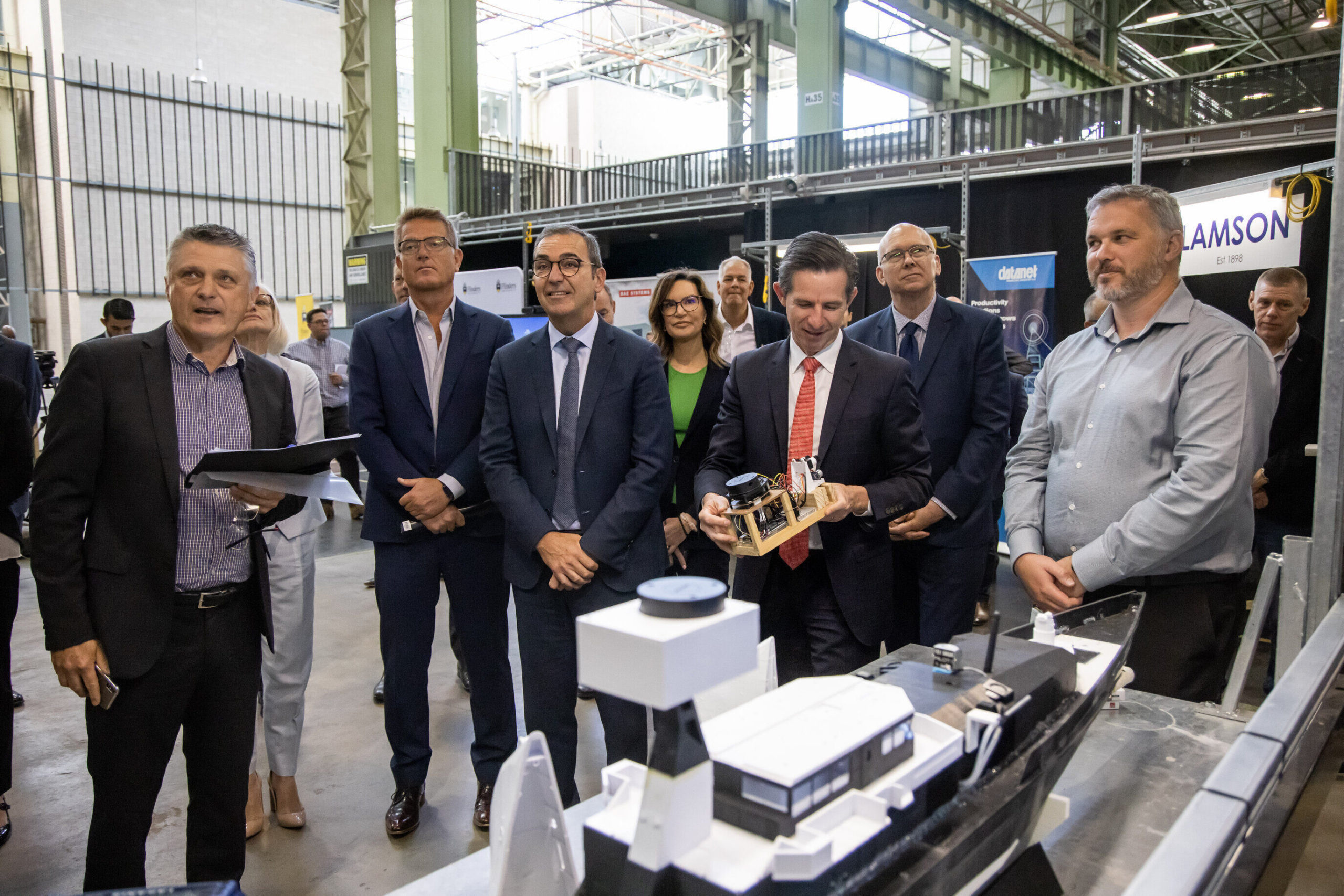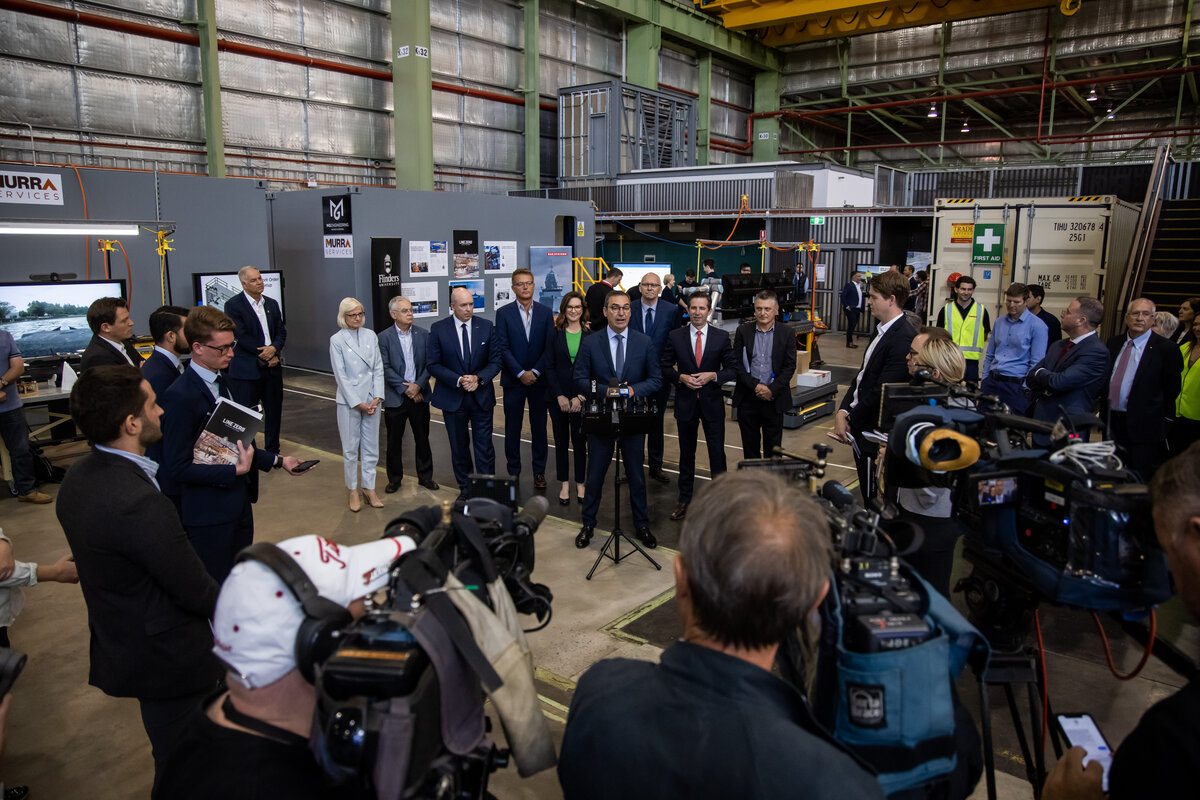
Fast tracking world leading manufacturing technologies and processes to support major defence projects such as the Hunter Class Frigate Program and boost South Australia’s advanced manufacturing sector are at the heart of a Flinders University “manufacturing accelerator” initiative which is being supported by the South Australian Government.
Premier Steven Marshall has visited the site for construction of Stage One of the Line Zero – Factory of the Future facility to see first-hand some of the advanced technologies and processes that will be supported by the State’s $5 million commitment, matching Flinders University’s investment in the initiative.
The Line Zero – Factory of the Future will be a world class manufacturing accelerator embedded within South Australia’s Tonsley Innovation District.
Driven by Flinders University, it began with a temporary pilot ‘pop up’ factory developed in collaboration with BAE Systems Maritime Australia. The $10m co-funding enables a permanent Factory of the Future to now be built.
https://www.youtube.com/watch?v=nLfCs8x2a4c&ab_channel=LineZero%E2%80%93FactoryoftheFuture
In thanking the state government for its visionary investment in a permanent facility Flinders University Vice-Chancellor, Professor Colin Stirling said:
“The Line Zero – Factory of the Future is a crucial element in our research translation; taking research out of the lab and applying it in the real world.
“Flinders University’s new Factory of the Future at Line Zero will help accelerate the growth of advanced manufacturing necessary to support the Federal Government’s $90 billion naval shipbuilding program in SA.
“We welcome the state government’s $5m investment, matching Flinders University’s own commitment to this important initiative that will position South Australia at the national vanguard of the Industry 4.0 agenda for advanced manufacturing technologies.
“Our initial focus will be on collaborative research and training designed to maximise the engagement of South Australian companies and workers with the shipbuilding industry. However, future stages of the Factory of the Future will support a broad range of industries, enabling their trialling and adoption of Industry 4.0 technologies, thus contributing to durable jobs growth across the South Australian economy.”

BAE Systems Maritime Australia Managing Director, Craig Lockhart, said:
“Digital shipbuilding is all about connectivity – not just within the physical and digital shipyard but with our supply chain and customer – and the partnership between BAE Systems Maritime Australia and Flinders University at Tonsley is creating a digital and advanced manufacturing test environment to improve outcomes at Osborne.
“The Line Zero – Pilot Factory of the Future facility provides a controlled space where we can collaborate with industry and researchers to trial new manufacturing techniques and processes that will ultimately be used by BAE Systems Maritime Australia to build the nine Hunter class frigates.
“It is our ambition that the digital and technological advancements demonstrated by the supply chain will lead to improved productivity, safety and quality outcomes, equipping our highly-skilled workforce with Industry 4.0 technologies that support activities undertaken in a modern digital shipyard.
“Just last month we announced four Australian companies we selected as part of our inaugural ‘Innovation Challenge’ to showcase their ‘track and trace’ technologies, and we are now calling on businesses to lodge expressions of interest for the second challenge – focusing on digital safety technologies.”
__
The Pilot Line Zero factory was established in 2020 as a joint venture between Flinders University and BAE Systems Maritime Australia (formerly ASC Shipbuilding) as a proving ground for technologies that can be adapted to the Hunter program.
The $10 million jointly provided by Flinders University and the State Government will fast track the expansion of the Flinders University Factory of the Future in supporting a wider range of manufacturing interests and setting the scene for future stages pending investment.

